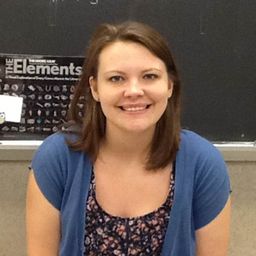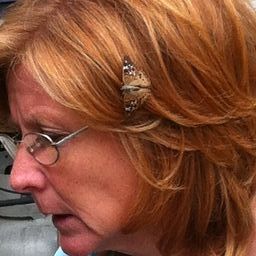Properties and Changes of Matter Chapter Review Answers Glencoe
Problem i
A Create a tabular array that describes the three common states of thing in
terms of their shape, volume, and compressibilit
Janos S.
Numerade Educator
Problem 2
Describe the characteristics that place a sample of matter as a substance.

Linhan Y.
Numerade Educator
Problem 3
Classify each of the following equally a physical or a chemical proper
\begin{equation}
\brainstorm{array}{l}{\text { a. Iron and oxygen course rust. }} \\ {\text { b. Iron is more dense than aluminum. }} \\ {\text { c. Magnesium burns brightly when ignited. }} \\ {\text { d. Oil and water do not mix. }} \\ {\text { east. Mercury melts at }-39^{\circ} \mathrm{C} \text { . }}\end{array}
\end{equation}
Janos South.
Numerade Educator
Problem 4
Organize Create a nautical chart that compares physical and chemical properties. Give
two examples for each blazon of proper.

Problem five
Use the information in the table to reply the following questions.
How many grams of bromine reacted? How many grams of compound were formed?

Problem 6
From a laboratory procedure designed to divide water into hydrogen and oxygen gas,
a student collected 10.0 thou of hydrogen and 79.4 thousand of oxygen. How much water was
originally involved in the process?

Linhan Y.
Numerade Educator
Trouble vii
A pupil advisedly placed 15.6 g of sodium in a reactor supplied with an excess quantity
of chlorine gas. When the reaction was consummate, the educatee obtained 39.vii thou of sodium
chloride. Summate how many grams of chlorine gas reacted. How many grams of
sodium reacted?
Janos South.
Numerade Educator
Trouble 8
A 10.0-thou sample of magnesium reacts with oxygen to form 16.half-dozen k of magnesium oxide.
How many grams of oxygen reacted?

Linhan Y.
Numerade Educator
Trouble nine
Challenge 106.5 g of HCl(g) react with an unknown corporeality of $\mathrm{NH}_{3}(\mathrm{grand})$ to produce 157.5 $\mathrm{g}$ of $\mathrm{NH}_{4} \mathrm{Cl}(\mathrm{s})$ . How many grams of $\mathrm{NH}_{3}(\mathrm{chiliad})$ reacted? Is the law of conservation of
mass observed in the reaction? Justify your respond.

Trouble ten
A Classify each instance as a physical alter or a chemical change.
\begin{equation}
\begin{array}{l}{\text { a. crushing an aluminum can }} \\ {\text { b. recycling used aluminum cans to make new aluminum cans }} \\ {\text { c. aluminum combining with oxygen to form aluminum oxide }}\end{assortment}
\stop{equation}

Linhan Y.
Numerade Educator
Problem eleven
Depict the results of a physical change and list iii examples of physical
change.

Trouble 12
Draw the results of a chemical change. Listing four indicators of chemical
change.

Linhan Y.
Numerade Educator
Problem thirteen
Summate Solve each of the following.
\brainstorm{equation}
\begin{array}{50}{\text { a. In the complete reaction of } 22.99 \mathrm{1000} \text { of sodium with } 35.45 \mathrm{1000} \text { of chlorine, what }} \\ {\text { mass of sodium chloride is formed? }}\end{assortment}
\end{equation}
\begin{equation}
\begin{array}{l}{\text { b. } A 12.ii \text { -g sample of } X \text { reacts with a sample of } Y \text { to class } 78.9 \text { g of } X Y . \text { What }} \\ {\text { is the mass of } Y \text { that reacted? }}\end{assortment}
\terminate{equation}
Janos South.
Numerade Educator
Trouble 14
Evaluate A friend tells you, "Because composition does not change
during a physical change, the appearance of a substance does non change."
Is your friend correct? Explain.

Linhan Y.
Numerade Educator
Trouble 15
A Classify each of the following as either a heterogeneous or a
homogeneous mixture.
a. tap water $\quad$ b. air $\quad$ c. raisin muffin
Janos Southward.
Numerade Educator
Trouble 16
Compare mixtures and substances.

Linhan Y.
Numerade Educator
Trouble 17
Describe the separation technique that could be used to carve up each of the
following mixture.
\begin{equation}
\begin{assortment}{l}{\text { a. ii colorless liquids }} \\ {\text { b. a nondissolving solid mixed with a liquid }} \\ {\text { c. ruddy and blueish marbles of the same size and mass }}\finish{array}
\terminate{equation}
Janos S.
Numerade Educator
Problem xviii
Design a concept map that summarizes the relationships amidst matter,
elements, mixtures, compounds, pure substances, homogeneous mixtures, and
heterogeneous mixtures.

Linhan Y.
Numerade Educator
Problem 19
A 78.0 -g sample of an unknown compound contains 12.4 k of
hydrogen. What is the percent by mass of hydrogen in the compound?
Janos S.
Numerade Educator
Problem 20
ane.0 $\mathrm{thousand}$ of hydrogen reacts completely with 19.0 $\mathrm{g}$ of fluorine. What is the
percent by mass of hydrogen in the compound that is formed?

Linhan Y.
Numerade Educator
Problem 21
If 3.5 $\mathrm{yard}$ of element $\mathrm{Ten}$ reacts with 10.v $\mathrm{g}$ of chemical element $\mathrm{Y}$ to form the
compound $\mathrm{XY},$ what is the percent by mass of element $\mathrm{X}$ in the
compound? The per centum by mass of element $\mathrm{Y}$ ?

Problem 22
Two unknown compounds are tested. Chemical compound I contains 15.0 $\mathrm{g}$ of
hydrogen and 120.0 g of oxygen. Compound II contains 2.0 $\mathrm{g}$ of
hydrogen and 32.0 $\mathrm{g}$ of oxygen. Are the compounds the same? Explain
your answer.

Linhan Y.
Numerade Educator
Problem 23
Challenge All you know nearly two unknown compounds is that they
have the same per centum by mass of carbon. With just this information,
can you exist sure the two compounds are the aforementioned? Explicate.

Trouble 24
Compare and contrast elements and compounds.

Linhan Y.
Numerade Educator
Problem 25
Describe the bones organizational feature of the periodic table of the elements.

Problem 26
Explain how the law of definite proportions applies to compounds.

Problem 27
State the type of compounds that are compared in the law of multiple
proportions.

Problem 28
Consummate the table, and so analyze the datat to determine if Compounds I
and ll are the same compound. If the compounds are different, use the law of
multiple proportions to evidence the relationship between them.

Problem 29
Summate the mass percent of hydrogen in water and the mass pct of
oxygen in water.

Trouble 30
Graph Create a graph that illustrates the law of multiple proportions.

Problem 31
Listing 3 examples of substances. Explain why each is a
substance.

Problem 32
Is carbon dioxide gas a pure substance? Explain.

Linhan Y.
Numerade Educator
Problem 33
List at least three physical properties of water.

Problem 34
Place each physical property as extensive or intensive.
\brainstorm{equation}
\brainstorm{assortment}{ll}{\text { a. melting indicate }} & {\text { c. density }} \\ {\text { b. mass }} & {\text { d. length }}\stop{array}
\end{equation}

Linhan Y.
Numerade Educator
Trouble 35
"Properties are not affected by changes in temperature
and pressure." Is this statement true or false? Explain.

Problem 36
List the three states of matter, and requite an example for
each land. Differentiate betwixt a gas and a vapor.

Linhan Y.
Numerade Educator
Problem 37
Classify each as either a solid, a liquid, or a gas at room temperature.
\begin{equation}
\begin{array}{ll}{\text { a. milk }} & {\text { d. helium }} \\ {\text { b. air }} & {\text { e. diamond }} \\ {\text { c. copper }} & {\text { f. candle wax }}\end{assortment}
\stop{equation}

Problem 38
Classify each as a physical belongings or a chemical belongings.
\begin{equation}
\begin{array}{l}{\text { a. Aluminum has a silvery colour. }} \\ {\text { b. Gold has a density of 19 } \mathrm{grand} / \mathrm{cm}^{3} \text { . }} \\ {\text { c. Sodium ignites when dropped in h2o. }}\end{assortment}
\stop{equation}
\brainstorm{equation}
\begin{assortment}{50}{\text { d. Water boils at } 100^{\circ} \mathrm{C} \text { . }} \\ {\text { e. Argent tarnishes. }} \\ {\text { f. Mercury is a liquid at room temperature. }}\stop{array}
\stop{equation}

Linhan Y.
Numerade Educator
Problem 39
A carton of milk is poured into a bowl. Describe the
changes that occur in the milks shape and volume.

Trouble 40
Boiling H2o At what temperature would 250 $\mathrm{mL}$ of
water boil? 1000 $\mathrm{mL}$ ? Is the boiling point an intensive or
extensive belongings? Explicate.

Linhan Y.
Numerade Educator
Trouble 41
Chemical Analysis A scientist wants to identify an
unknown compound on the basis of its concrete backdrop. The substance is a white solid at room temperature. Attempts to determine its boiling betoken were unsuccessful. Using Table 3.6, name the unknown chemical compound.

Problem 42
Label each set of diagrams in Figure three.22 as a concrete
or a chemical change.

Linhan Y.
Numerade Educator
Problem 43
Classify each as a physical change or a chemical change.
\begin{equation}
\begin{array}{l}{\text { a. breaking a pencil in ii }} \\ {\text { b. water freezing and forming ice }} \\ {\text { c. frying an egg }} \\ {\text { d. burning wood }} \\ {\text { eastward. leaves irresolute colors in the fall }}\stop{array}
\end{equation}

Problem 44
Ripening Is the process of bananas ripening a chemical
change or a physical modify? Explain.

Linhan Y.
Numerade Educator
Trouble 45
Is a change in stage a concrete alter or a chemical
modify? Explicate.

Problem 46
Listing 4 indicators that a chemical modify has probably occured.

Linhan Y.
Numerade Educator
Trouble 47
Rust Iron and oxygen combine to form iron oxide, or
rust. Listing the reactants and products of this reaction.

Problem 48
Burning Candle After burning for three hours, a candle has lost half of its mass. Explain why this example
does not violate the law of conservation of mass.

Linhan Y.
Numerade Educator
Problem 49
Describe the difference between a physical change and a
chemic change.

Problem 50
Ammonia Production $\mathrm{A} 28.0$ -one thousand sample of nitrogen gas
combines completely with vi.0 $\mathrm{g}$ of hydrogen gas to form
ammonia. What is the mass of ammonia formed?

Linhan Y.
Numerade Educator
Problem 51
A xiii.0 -thousand sample of Ten combines with a $34.0-\mathrm{one thousand}$ sample of
$\mathrm{Y}$ to form the chemical compound $\mathrm{XY}_{2} .$ What is the mass of the
reactants?

Problem 52
If 45.98 $\mathrm{g}$ of sodium combines with an backlog of chlorine
gas to grade 116.89 $\mathrm{g}$ of sodium chloride, what mass of
chlorine gas is used in the reaction?

Linhan Y.
Numerade Educator
Problem 53
A substance breaks down into its component elements
when information technology is heated. If 68.0 g of the substance is present
before it is heated, what is the combined mass of the
component elements later heating?

Trouble 54
Copper sulfide is formed when copper and sulfur are
heated together. In this reaction, 127 $\mathrm{g}$ of copper reacts
with 41 $\mathrm{thousand}$ of sulfur. After the reaction is complete, 9 $\mathrm{1000}$ of
sulfur remains unreacted. What is the mass of copper
sulfide formed?

Linhan Y.
Numerade Educator
Problem 55
When called-for 180 of glucose in the presence of
192 of oxygen, water and carbon dioxide are
produced. If 108 gof water is produced, how much
carbon dioxide is produced?

Trouble 56
Describe the characteristics of a mixture.

Linhan Y.
Numerade Educator
Problem 57
Proper name the separation method illustrated in Figure 3.23

Regina H.
Numerade Educator
Problem 58
Draw a method that could be used to separate each mixture.
\begin{equation}
\brainstorm{array}{ll}{\text { a. iron filings and sand }} & {\text { c. the components of ink }} \\ {\text { b. sand and salt }} & {\text { d. helium and oxygen gases }}\cease{array}
\end{equation}

Linhan Y.
Numerade Educator
Problem 59
"A mixture is the chemical bonding of two or more sub-
stances in any proportion." Is this statement true or
false? Explain.

Problem 60
Which of the post-obit are the aforementioned and which are different?
\begin{equation}
\begin{assortment}{50}{\text { a. a substance and a pure substance }} \\ {\text { b. a heterogeneous mixture and a solution }} \\ {\text { c. a substance and a mixture }} \\ {\text { d. a homogeneous mixture and a solution }}\terminate{array}
\end{equation}

Linhan Y.
Numerade Educator
Trouble 61
Draw how a homogeneous mixture differs from a heterogeneous mixture.

Trouble 62
Seawater is composed of salt, sand, and water. Is seawater a heterogeneous or homogeneous mixture? Explain.

Linhan Y.
Numerade Educator
Problem 63
Iced Tea Utilise iced tea with and without water ice cubes equally
examples to explain homogeneous and heterogeneous
mixtures. If you allow all of the ice cubes to melt, what
type of mixture remains?

Problem 64
Chromatography What is chromatography, and how
does it work?

Linhan Y.
Numerade Educator
Problem 66
Right the post-obit statements.
\begin{equation}
\begin{assortment}{l}{\text { a. An element is a combination of two or more }} \\ {\text { compounds. }} \\ {\text { b. When a pocket-size amount of sugar is completely dissolved }} \\ {\text { in water, a heterogeneous solution is formed. }}\end{array}
\finish{equation}

Linhan Y.
Numerade Educator
Problem 67
Name the elements contained in the following compounds.
\begin{equation}
\brainstorm{array}{ll}{\text { a. sodium chloride }(\mathrm{NaCl})} & {\text { c. ethanol }\left(\mathrm{C}_{2} \mathrm{H}_{6} \mathrm{O}\right)} \\ {\text { b. ammonia }\left(\mathrm{NH}_{3}\right)} & {\mathrm{d} \text { bromine }\left(\mathrm{Br}_{2}\right)}\stop{assortment}
\end{equation}

Problem 68
What was Dmitri Mendeleev'due south major contribution to the
field of chemistry?

Linhan Y.
Numerade Educator
Problem 69
Is it possible to distinguish between an chemical element and a
chemical compound? Explain.

Trouble 70
How are the properties of a compound related to those
of the elements that comprise it?

Linhan Y.
Numerade Educator
Problem 71
Which law states that a compound ever contains the
same elements in the aforementioned proportion by mass?

Problem 72
\begin{equation}
\begin{array}{l}{\text { a. What is the percent past mass of carbon in } 44 \text { of }} \\ {\text { carbon dioxide }\left(\mathrm{CO}_{2}\right) ?} \\ {\text { b. What is the percent by mass of oxygen in } 44 \mathrm{yard} \text { of }} \\ {\text { carbon dioxide }\left(\mathrm{CO}_{2}\right) ?}\end{array}
\end{equation}

Linhan Y.
Numerade Educator
Problem 73
Complete Table 3.7 past classifying the compounds every bit
$1 : i$ or $two : 2,ane : 2$ or $2 : 1,$ and $1 : 3$ or $three : 1 .$

Problem 74
A $25.3-\mathrm{g}$ sample of an unknown compound contains
0.8 $\mathrm{g}$ of oxygen. What is the per centum by mass of oxygen
in the chemical compound?

Linhan Y.
Numerade Educator
Problem 75
Magnesium combines with oxygen to class magnesium
oxide. If 10.57 yard of magnesium reacts completely with
6.96 thousand of oxygen, what is the percent by mass of oxygen
in magnesium oxide?

Trouble 76
When mercury oxide is heated, it decomposes into
mercury and oxygen. If 28.four g of mercury oxide decom-
poses, producing 2.0 $\mathrm{1000}$ of oxygen, what is the percent by
mass of mercury in mercury oxide?

Linhan Y.
Numerade Educator
Trouble 77
Carbon reacts with oxygen to form two different compounds. Chemical compound I contains iv.82 thousand of carbon for
every 6.44 chiliad of oxygen. Compound 2 contains twenty.13 $\mathrm{g}$
of carbon for every 53.vii $\mathrm{thou}$ of oxygen. What is the ratio of
carbon to a fixed mass of oxygen for the two compounds?

Problem 78
A 100 -g sample of an unknown salt contains 64 one thousand of
chlorine. What is the percent past mass of chlorine in the
compound?

Linhan Y.
Numerade Educator
Trouble 79
Which law would you employ to compare $\mathrm{CO}$ and $\mathrm{CO}_{2}$ ?
Explicate. Without doing whatever calculations, determine
which of the two compounds has the highest percent
by mass of oxygen in the chemical compound.

Problem 81
Which state(southward) of matter are compressible? Which
state(s) of matter are not compressible? Explicate.

Problem 82
Classify each mixture as homogeneous or heterogeneous.
\begin{equation}
\begin{assortment}{l}{\text { a. brass (an alloy of zinc and copper) }} \\ {\text { b. a salad }} \\ {\text { c. blood }} \\ {\text { d. powdered drinkable mix dissolved in water }}\end{assortment}
\stop{equation}

Linhan Y.
Numerade Educator
Problem 83
Phosphorus combines with hydrogen to class phosphine. In this reaction, $123.9 \mathrm{~m}$ of phosphorus combines with excess hydrogen to produce $129.ix \mathrm{~1000}$ of phosphine. Afterward the reaction, $310 \mathrm{~g}$ of hydrogen remains unreacted. What mass of hydrogen is used in the reaction? What was the initial mass of hydrogen before the reaction?

Charotte Thousand.
Numerade Educator
Trouble 84
If you accept 100 particles of hydrogen and 100 particles
of oxygen, how many units of water can y'all course? Will
you utilize all the particles of both elements? If not, what
will remain?

Linhan Y.
Numerade Educator
Problem 85
Classify each substance as a pure substance, a homogeneous mixture, or a heterogeneous mixture.
\begin{equation}
\brainstorm{array}{llll}{\text { a. air }} & {\text { c. soil }} & {\text { due east. sediment }} \\ {\text { b. droplets }} & {\text { d. water }} & {\text { f. muddy water }}\end{array}
\cease{equation}

Problem 86
Place each as a homogenous mixture, a heterogeneous mixture, a compound, or an element.
\begin{equation}
\brainstorm{array}{50}{\text { a. pure drinking water }} \\ {\text { b. salty water }} \\ {\text { c. helium }}\end{array}
\end{equation}
\brainstorm{equation}
\begin{array}{l}{\text { d. seawater }} \\ {\text { e. air }}\terminate{array}
\end{equation}

Linhan Y.
Numerade Educator
Problem 87
Cooking List physical backdrop of eggs before and
after they are cooked. Based on your observations, does
a concrete modify or chemical change occur when eggs
are cooked? Justify your answer.

Trouble 88
Water ice Cream Y'all might have noticed that while eating ice
cream on a hot 24-hour interval, some of the ice cream begins to
melt. Is the observed change in the land of the water ice cream
a concrete or a chemical change? Justify your answer.

Linhan Y.
Numerade Educator
Problem 89
Iced Tea Is a mixture of tea and ice homogeneous or heterogeneous? Does that change as the water ice melts?

Problem 90
Sodium reacts chemically with chlorine to form sodium
chloride. Is sodium chloride a mixture or a compound?

Linhan Y.
Numerade Educator
Problem 91
Is air a solution or a heterogeneous mixture? What technique tin be used to separate air into its components?

Problem 92
Indicate whether combining the following elements yields a compound or a mixture,
\begin{equation}
\begin{array}{l}{\text { a. } \mathrm{H}_{2}(\mathrm{thousand})+\mathrm{O}_{2}(\mathrm{thou}) \rightarrow \text { h2o }} \\ {\text { b. } \mathrm{Northward}_{2}(\mathrm{1000})+\mathrm{O}_{2}(\mathrm{g}) \rightarrow \text { air }}\stop{array}
\end{equation}

Linhan Y.
Numerade Educator
Trouble 93
Interpret Information A compound contains the elements $X$
and $Y .$ Four samples with different masses were analyzed, and the masses of $X$ and $Y$ in each sample were plotted on a graph shown in Effigy $three.24 .$ The samples
were labeled I, II, Three, and IV.
\begin{equation}
\begin{array}{fifty}{\text { a. Which samples are from the aforementioned compound? How }} \\ {\text { do you know? }} \\ {\text { b. What is the judge ratio of the mass of } X \text { to the }} \\ {\text { mass of } Y \text { in the samples that are from the same }} \\ {\text { chemical compound? }}\end{array}
\cease{equation}
\begin{equation}
\brainstorm{assortment}{l}{\text { c. What is the approximate ratio of the mass of } X \text { to the }} \\ {\text { mass of } Y \text { in the sample(s) that are not from the same }} \\ {\text { compound? }}\end{array}
\finish{equation}

Problem 94
Employ Air is a mixture of many gases, primarily nitrogen, oxygen, and argon. Could distillation be used to
separate air into its component gases? Explain.

Linhan Y.
Numerade Educator
Problem 95
Analyze Is gas escaping from an opened soft drink an
example of a chemical or a physical change? Explicate.

Problem 96
Apply Give examples of heterogeneous mixtures for the
systems listed in Tabular array $3.9 .$

Linhan Y.
Numerade Educator
Problem 97
Identify Pb Compounds A sample of a certain lead
compound contains six.46 chiliad of atomic number 82 for each gram of oxy-
gen. A second sample has a mass of 68.54 $\mathrm{g}$ and contains
28.76 $\mathrm{g}$ of oxygen. Are the two samples the same?
Explain.

Problem 98
What is chemistry? (Affiliate ane$)$

Linhan Y.
Numerade Educator
Problem 100
Express the post-obit numbers in scientific notation. (Chapter ii$)$
\begin{equation}
\brainstorm{assortment}{ll}{\text { a. } 34,500} & {\text { d. } 789} \\ {\text { b. } 2665} & {\text { e. } 75,600} \\ {\text { c. } 0.9640} & {\text { f. } 0.002189}\end{array}
\end{equation}

Problem 101
Perform the following operations. (Chapter 2$)$
\begin{equation}
\begin{array}{l}{\text { a. } 10^{vii} \times 10^{3}} \\ {\text { b. }\left(1.4 \times 10^{-3}\right) \times\left(5.1 . \times x^{-5}\right)} \\ {\text { c. }\left(2 \times 10^{-iii}\right) \times\left(4 \times ten^{five}\right)}\end{array}
\terminate{equation}

Problem 102
Convert $65^{\circ} \mathrm{C}$ to kelvins. (Chapter 2$)$

Linhan Y.
Numerade Educator
Trouble 103
Graph the data in Tabular array 3.10. What is the slope of the
line? (Affiliate 2$)$

Trouble 104
Constructed Elements Select a synthetic element, and
set a short written report on its evolution. Be
certain to hash out recent discoveries, list major research
centers that conduct this type of research, and
describe the properties of the synthesized element.

Himanshu G.
Numerade Educator
Problem 105
\begin{equation}
\brainstorm{array}{l}{\text { a. Compare the mass percent of carbon in charcoal, }} \\ {\text { indigo, and verdigris. }} \\ {\text { b. Compare the mass percent of oxygen in iron oxide }} \\ {\text { and Egyptian blueish. }}\end{array}
\end{equation}

Problem 106
List an example of an element and a compound from
Table 3.11 .

Linhan Y.
Numerade Educator
Problem 107
Is the production of charcoal from the dry out distillation
of wood a chemical or a concrete alter? Explain.

Source: https://www.numerade.com/books/chapter/matter-properties-and-changes/
0 Response to "Properties and Changes of Matter Chapter Review Answers Glencoe"
Post a Comment